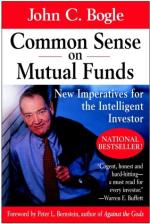 | |
| Author | John Bogle |
|---|---|
| Language | English |
| Subject | Mutual funds |
Publication date | March 18, 1999 |
| Publication place | United States |
Published in English | John C. Wiley & Sons |
Common Sense on Mutual Funds: New Imperatives for the Intelligent Investor, written by John Bogle, is a book educating investors about mutual funds, with a focus on the praise of index funds and the importance of having a long-term strategy. On the dust jacket cover, Jim Cramer wrote, "After a lifetime of picking stocks, I have to admit that (Vanguard Group founder John) Bogle's arguments in favor of the index fund have me thinking of joining him rather than trying to beat him." [1]
Since its release, it has received high accolades in the investment community. It has become a bestseller and is considered a "classic". [2] [3] ConsumerAffairs.com rated it on its "15 Business Books That Could Actually Help Make You Rich" list. [4]
Though it is aimed at American audiences, the British newspaper The Independent stated "there is nothing in it that does not apply in some measure to the UK fund industry." [5]